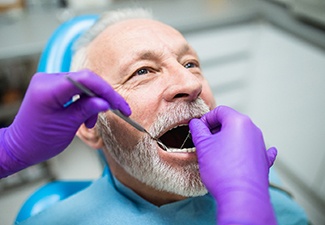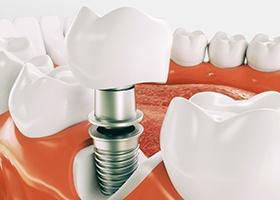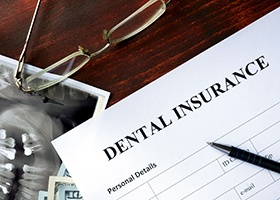Dental Implants — Leawood, KS
Replace Missing Teeth for Life!

Whether it’s just one tooth or a whole arch, losing teeth can be a truly devastating experience. Not only is your oral health compromised, but your self-confidence takes a blow too, making it difficult to talk or smile around others without feeling embarrassed. During this trying time, what you need is support from a team you can trust, and that’s just what you’ll find here at our Leawood, KS dental office. Dr. Dennis Ayer is committed to offering revolutionary implant dentistry services that can seamlessly restore your teeth and give you back the natural strength you need to maintain the structural integrity of your mouth.
Why Choose Dennis C. Ayer, DDS, LLC for Dental Implants?
- Dental Implant Restoration and Placement In 1 Location
- Member of the International College of Oral Implantologists (ICOI)
- State-of-the-Art Diagnostic Technology and Dental Office
What Are Dental Implants?

The secret behind the revolutionary success of dental implants is that they replicate the entire structure of the tooth instead of simply the crown (the visible portion). With the help of a biocompatible titanium “root,” patients can preserve the health of their jawbone and even encourage new growth throughout the years, resulting in a revitalized, aesthetically pleasing outcome. The result is better oral and overall health, a major boost in your confidence and self-esteem, and the ability to eat all the foods you enjoy without worry of your tooth replacement shifting out of place.
The Dental Implant Process

Treatment for dental implants can be broken down into four specific stages. This includes the initial consultation to discuss your needs, the surgery where the implants are placed, a dedicated healing period where the implant integrates, and the final placement of a personalized crown, bridge, or denture. While most dental offices need to refer patients elsewhere for the surgical portion of their implant procedure, Dr. Ayer has the specialized training and experience necessary to smoothly handle many of these procedures right here in our Leawood dentistry practice.
Initial Consultation

Before any treatment actually begins, Dr. Ayer will need to determine whether or not you’re a viable candidate for the implant procedure and what exactly your unique needs are so that he can be sure to approach them in the most ideal way possible. Once we have this vital information, our team can move forward with the first step of the procedure: the actual placement of your new implant or implants.
Dental Implant Surgery

Dr. Ayer or one of his hand selected specialists will carefully and securely insert the implants into your jawbone. The placement is performed under local anesthesia and sedation as needed for your comfort. Your dentist opens the gum tissue and places each dental implant in the most optimal position for secure anchoring. Once the implant(s) have been placed, the gums are closed and recovery begins.
Osseointegration & Abutment Placement

Over a healing period of about three to six months, the implants will slowly form a bond with your natural tissue, creating a solid foundation. This process, known as osseointegration, stabilizes the implant in the mouth for years to come. At some point, we will uncover your implants and attach small posts (called abutments) that will serve as the anchors for your replacement teeth.
Delivery of Final Restoration

Once the implant and jaw have fused together, the prosthetic tooth/teeth can be affixed on top of the implant(s). This means you’ll come back to our office to have the permanent restoration attached. Your restoration is made from natural-looking dental materials that are not only durable, but blend in with your existing teeth.
Benefits of Dental Implants

Everyone wants a complete, healthy smile. However, many people lose one or more teeth due to decay, gum disease, trauma, or other unfortunate circumstances. If you have are missing one or two or even all your pearly whites, don’t despair! Dental implants are a comprehensive tooth loss solution that come with a long list of benefits, especially when you compare them to traditional bridges and dentures.
Day-to-Day Benefits

Dental implants are so secure that they’ll never slip out of your mouth while you’re speaking, and they won’t make your gums sore either. In fact, they’re so comfortable and lifelike that you might even forget you have them!
Caring for your dental implants on a daily basis is easy. Simply brush them twice a day with a non-abrasive toothbrush, and be sure to floss regularly. It’s also important to attend regular checkups with your dentist in Leawood so Dr. Ayer can make sure that all is well. Although your restored teeth cannot develop decay, we’ll make sure your gums and your new smile stay healthy.
Health Benefits

Tooth loss often leads to more tooth loss. That’s because when one of your teeth leaves its place, the ones that were next to it may begin to drift. This can lead to a misaligned bite, jaw problems, and a lot of extra wear and tear on your poor smile. If you lose a bottom tooth, the one directly above it can even extend too far out of the gum line or fall out altogether. Implants serve as placeholders, helping to keep all of your remaining natural teeth right where they belong.
One of the most outstanding benefits of dental implants is that they are strong enough to stand up to pretty much any food you might be craving. Whether you want to chow down on some crunchy vegetables, dig into that juicy steak, or snack on some popcorn during movie night, you can do so without worry (just be careful not to bite on any solid popcorn kernels).
Long-Term Benefits

Did you know that traditional dentures need to be replaced every five to eight years or so? That’s because the way they fit changes over time as the jawbone deteriorates. Other tooth replacement methods, such as traditional bridges, might only last for 10 years. Dental implants, on the other hand, form a permanent bond with your body and have the potential to last a lifetime.
Who Dental Implants Can Help

Dental implants are a fantastic solution for any level of tooth loss. Thanks to their versatility, it’s relatively straightforward to replace everything from individual teeth to an entire arch all at the same time. Continue reading to learn more about how dental implants can help in a wide range of situations.
Who Is a Good Candidate for Dental Implants?

Most adults in good health are able to get dental implants without much of an issue. Here are the important criteria we look at to determine who makes a good candidate for dental implants:
- Overall Health: Placing dental implants requires a surgical procedure, so you need to be in good enough health to undergo this.
- Oral Health: Cavities and gum disease increase your risk of dental implant failure. If you have any existing oral health issues, they should be addressed before you get dental implants.
- Jawbone Density: You must have an adequate enough jawbone to successfully support dental implants.
If you aren’t a good candidate for dental implants now, this doesn’t necessarily rule them out for the future. Many patients need to have preliminary procedures completed beforehand, like tooth extractions, gum disease treatment, and bone grafting. We are more than happy to help you get these procedures scheduled so you can work toward getting dental implants down the line.
Missing One Tooth

In the case of a single missing tooth, a dental crown will be created to sit atop one surgically placed implant. The dental crown is color-matched to fit in perfectly with the surrounding teeth. No one will be able to tell the difference between your replacement tooth and your natural ones!
Missing Multiple Teeth

If you need multiple teeth to replenish your smile, dental implants can be used to secure a dental bridge to replace three or more consecutive missing teeth. If teeth are missing in different locations along an arch, a partial denture can be secured to dental implants instead.
Missing All Teeth

By using strategically placed implants within the mouth, we can create a permanent foundation with an implant denture, adding a much-needed sense of stability and retention that patients struggling with traditional dentures will appreciate.
Understanding the Cost of Dental Implants

There is no doubt that for many patients, dental implants are the best tooth replacement option. However, this treatment is admittedly a bit on the expensive side. Why do implants cost so much, what might help you afford them, and are they really worth the investment? Let’s talk about these important questions so you can make a confident, informed decision about whether dental implants in Leawood are right for you.
The Parts & Type of Your Dental Implant

In addition to the implants and their restorations, you may also have to pay for:
- Tooth extractions prior to your implant placement surgery
- Gum disease treatment to reduce the risk of infection around your implants
- A bone graft to make sure the jaw is strong enough to support implants
- Sedation to help you remain comfortable during your surgery
Numerous manufacturers create dental implants, and there are a few different types of implants available. Naturally, the quality of the implants as well as how many you need to support your new smile will influence the cost of your procedure. The complexity of the placement surgery and the nature of your restoration (whether it is a crown, bridge, or denture) will also play big roles in the overall price of your treatment.
Why Dental Implants are Worth the Cost

The cost of dental implants in Leawood might make you balk, but they are worth the price! Their strength, stability, longevity, and aesthetic beauty make them far superior to other tooth replacement options. They are a wise investment that has the potential to provide you with a lifetime of healthy, confident smiles.
Does My Dental Insurance Cover Dental Implants?

You’ll have to check the details of your policy to discover whether it provides coverage for dental implants. Even if it does not cover the implants themselves, it may help with preliminary work. You should also check to see if your medical insurance provides assistance with dental implants.
Making Dental Implants Affordable

The entire dental implant process takes place over several stages, so you only have to pay for one portion of the treatment at a time. You can use the time between the treatment steps to plan for the next leg of your smile restoration journey.
When we’re planning for your new smile, we’ll thoroughly discuss your implant options with you and help you understand their costs. Most patients are eligible for low- or no-interest financing that breaks up the price of their new smile into manageable monthly chunks. If you want to take advantage of financing, you should consider how big of a monthly payment you can comfortably fit into your budget.
Dental Implant Post-Op Instructions

After dental implant surgery, you’ll spend a few months recovering and waiting until you’re ready for the final step of your journey. Even though this process may sound long and stressful, it’s nothing to be worried about! Following your procedure, Dr. Ayer will provide you with post-op instructions to help you make a speedy and smooth sailing recovery. If you’d like to learn what to expect, continue reading or give our office a call today!
What to Do Directly After Dental Implant Surgery

The healing process may sound daunting, but it should be a breeze with proper care and maintenance. One of the most important things you need to do after oral surgery is care for the blood clot on the surgical site. You want to make sure it remains untouched so your gums can properly heal around the implant. To accomplish that, be sure to avoid:
- Spitting (use tissues or swallow your saliva)
- Drinking with a straw
- Smoking
- Touching the surgical site with your tongue or finger
Common Side-Effects When Recovering from Dental Implant Placement

If you’ve never had oral surgery before, you probably don’t which post-op symptoms are normal and which ones you should be concerned about. Generally speaking, any side-effects you experience are temporary and should gradually fade away over time. If that’s ever not the case, don't hesitate to let our dental team know.
That said, here’s what you can expect in the first few days following dental implant placement:
- Intermittent Bleeding – You can alleviate this by placing a small amount of pressure on the gauze that’s located on the surgical site.
- Swelling – You can reduce swelling by using a cold compress on your cheek or jaw for 10 minutes at a time.
- General Discomfort – Taking prescribed or over-the-counter pain medication can help minimize your discomfort.
Your Diet After Dental Implant Surgery

Make sure you stick to a soft-food diet for the first few days following dental implant placement. Before your procedure, you’ll want to stock up on the following foods:
- Mashed potatoes
- Yogurt
- Ice cream
- Pudding
- Scrambled eggs
- Pasta
- Soup (make sure it’s not too hot)
You can return to your usual diet as soon as you feel up for it. However, be sure to avoid chewing directly on the implant site.
Post-Op Health & Oral Hygiene

It’s incredibly important that you keep your mouth clean following dental implant placement to ensure the titanium posts fuse with the surrounding bone tissue via osseointegration. Although you can brush your teeth as you normally would, you’ll want to be extremely careful and gentle around the surgical site. Make sure you rinse with warm salt water two to three times per day, ideally after you eat. Don’t use mouthwash that contains high levels of alcohol, like Scope or Listerine.
What to Do After Your New Teeth Are Attached

Once you’re all healed up, you’ll return to the office for the final step in your journey – the attachment of your prosthetic! After your crown, bridge, or denture is placed, you might experience mild sensitivity in the gum tissue. Luckily, you can easily manage it by taking pain medication as needed. Since there won’t be any major side-effects following this appointment, you’ll be ready to make the most out of your new smile that same day!
Maintaining & Caring for Your Dental Implants

Dental implants are considered the gold standard of tooth replacement, expected to last many years with proper care. Following your procedure, Dr. Ayer will talk to you in-depth about maintenance for your specific restoration. If you fail to protect your new smile from damage and infection, you may experience implant failure, or your restorations will need replacement much sooner than anticipated. Luckily, there are many steps you can take to ensure your rebuilt grin lasts for a lifetime. To learn more, simply keep reading or schedule an appointment with our team today!
Make Oral Hygiene a Priority

Even though dental implants can’t get cavities, that doesn’t mean you can slack off on your oral hygiene. You must continue to follow a solid routine every morning and evening to keep your smile in tip-top shape. Brushing your teeth twice a day for two minutes, flossing daily, and rinsing with an ADA-approved mouthwash are essential at-home practices. Not only can they keep harmful bacteria from attacking your soft oral tissues, but they can prevent potential bone and tooth loss.
Eat a Healthy Diet

Once your dental implants are fully healed, you’ll be free to eat pretty much anything! However, you should try to keep your diet full of nutritious foods. Although it’s okay to consume sugary, starchy, and processed foods, it should only be in moderation. Otherwise, eating only those items can be detrimental to your smile. Make sure you eat foods that are rich in calcium and vitamin C to keep your jawbone strong and your gum tissues healthy.
Break Bad Habits

Are you guilty of any bad habits? Smoking, using tobacco products, biting your fingernails, chewing on ice, and using your teeth as tools can destroy your tooth enamel and damage your restoration. To protect your investment, you must do your best to kick these bad habits to the curb. Keep some sugar-free gum in your pocket for times when you feel tempted to chew on something that’s not food. Additionally, you can ask your dental team for resources that will help you quit smoking.
Protect Your Dental Implants

If you grind your teeth at night or enjoy playing sports, you should ask Dr. Ayer about getting a customized mouthguard. It’ll protect against oral injuries and potential damage to your implants. Additionally, it can help you avoid chronic jaw pain that can lead to temporomandibular joint disorder. A custom-made mouthguard is easy to use, effective against hard hits, and comfortable to wear.
Schedule Regular Dental Checkups

A healthy smile requires more than just brushing and flossing. You must visit your dentist every six months for a checkup and cleaning to keep your smile in optimal condition. These preventive visits will allow Dr. Ayer to monitor your prosthetics and restorations, ensuring there are no developing problems. He can address issues early on to help you avoid needing more expensive and complex dental treatments down the line.
Dental Implant FAQs

Whether you’ve been contemplating dental implant treatment for a long time or just now learning about them, it’s always good to come to our office with questions ready. The more we can make you feel informed and comfortable about tooth replacement through dental implants, the better. Below, we’ve included some of the most common questions our office receives regarding dental implants as well as our detailed answers. If yours is not listed or you’d rather speak with us in person, please give us a call and we’ll get you scheduled for a consultation.
Will I Have to Take Off Work for Dental Implant Surgery?
In most cases, you will likely need to set aside just one to two days off to recover from dental implants treatment. However, this does not necessarily mean you have to take time off from work. For example, scheduling your surgery to happen just before a weekend can work to minimize the number of days you’d need to take off from your job. Additionally, every patient is different and your job may not be as physically demanding as others. If you do need to perform physical labor for work, we may encourage you to set aside time off as strenuous activity can delay healing necessary for your implant.
Do Dental Implants Decay?
Dental implants (as well as the restoration attached to them) are made from dental ceramic, which cannot develop cavities. However, this does not mean you can skip your brushing and flossing routine at home. Oral bacteria can still produce plaque that harms the gum tissue surrounding the implant, putting it at risk of failure if you don’t practice oral hygiene regularly.
Is There Anything I Shouldn’t Eat with Dental Implants?
Over the first couple of weeks after surgery, it’s best to eat foods that don’t require strenuous chewing. This is particularly the case immediately after your surgery and for the next 72 hours following it. You should also avoid using a straw as this can cause your blood clot to dislodge. Once your implant has fully healed and a restoration is attached, you should be able to eat just about any food you want. Certain foods can be harmful to your dental implant (just like your natural teeth), including foods that are very hard or chewy. If you do decide to consume products with these qualities, use caution.
Will People Be Able to Tell That I Have Dental Implants?
Our office captures impressions of your mouth to ensure the most accurate restoration possible. After the restoration is attached, they should be indistinguishable from your neighboring teeth. As a result, only you and our office should be able to tell you had dental implants placed. Additionally, because dental implants are fixed inside of the jawbone like tooth roots, you won’t have to hold your jaw in any strange way to keep them in place.
